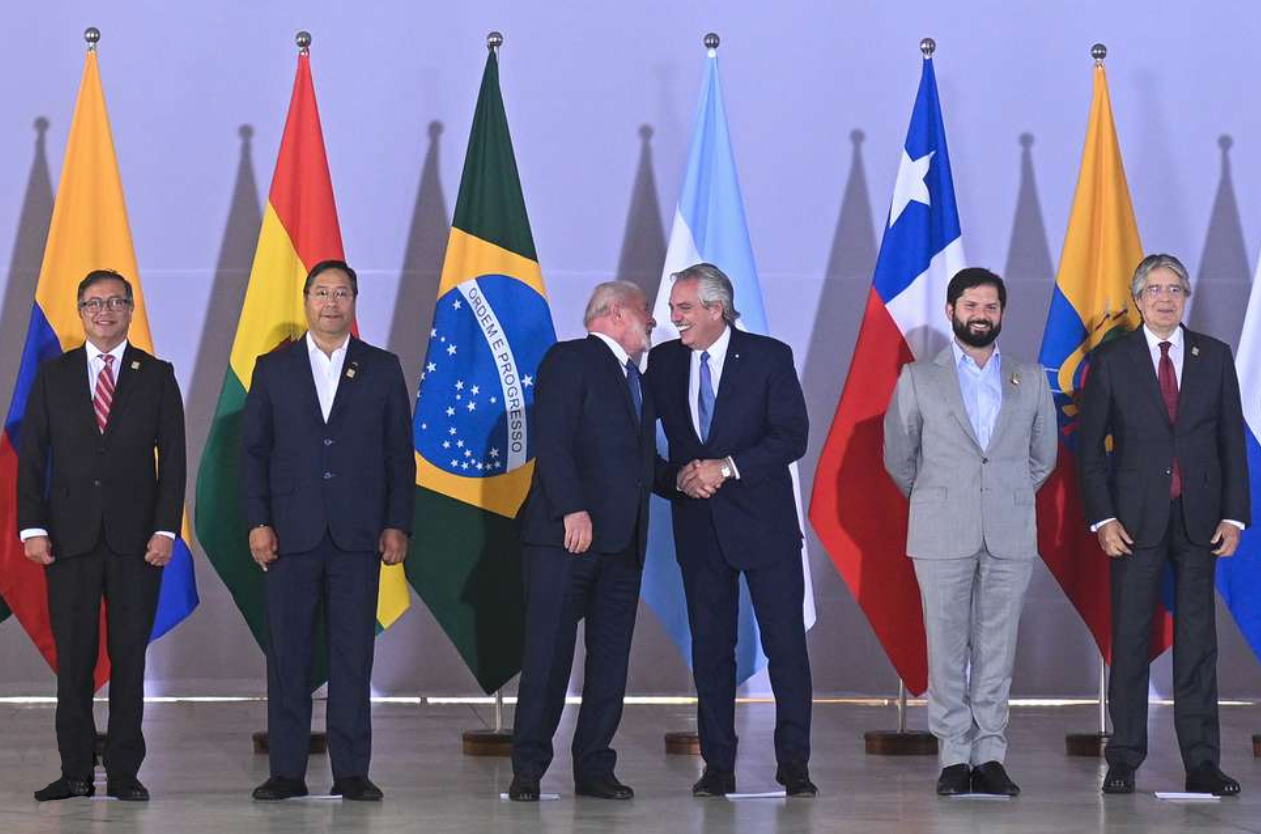After almost a decade, the heads of state of 11 countries have met in Brasília, with the purpose of restarting regional dialogue, reviewing the cooperation agenda, and establishing the programmatic and institutional bases of a renewed Union of South American Nations (UNASUR). This mechanism for consultation and coordination at the highest political-diplomatic level was created between 2008 and 2011. But after a period of development, this mechanism lost dynamism; and as of 2019, had to face a period of stagnation and crisis that almost led to its collapse.
Undoubtedly, the absence of dialogue among political leaders to address issues of intra-regional interest has been counterproductive. There are numerous issues that require regional and national solutions, such as economic infrastructure, social development, the promotion of environmental sustainability, the generation of science, technology, and innovation, the fight against transnational crime, energy transition, the implementation of cooperative security, migratory flows, human rights and citizenship, and sovereign international insertion, to name a few.
UNASUR is characterized by its intergovernmental nature. Frequently, this presupposes presumes that agreements among the rulers are decisive and the work of the general secretaries is normally under the supervision of the presidents and foreign affairs ministers of the full members. Thus, the inference is a limited cession of the sovereignty of the states in favor of supranational institutionality.
Thus, the ideological polarization of recent years in several countries and among leaders of the region has ended up increasing tensions and the credibility of this mechanism. This was particularly serious in Brazil, a pivotal state and the main power in South America. In other words, it is quite evident that there was insufficient institutional development, a lack of leadership, and financial limitations during UNASUR’s first decade.
In this context, the call of the Government of Brasília and the political will of the other leaders to participate in the meeting at the highest level (regardless of their respective political-ideological orientations and preferences) has undoubtedly been encouraging news. Officially, at present, UNASUR is only composed of 7 of the 12 South American countries, as full members. In this sense, one of the first tasks of the meeting was to seek the re-establishment of the participation of non-members.
The Brazilian president and host, Luiz Inácio Lula da Silva, is an experienced politician and one of the few founders of UNASUR still in office. Beyond the eventual marginal interests and benefits for Brazil in terms of leadership and prestige among the leaders of the continent and the geopolitical South, the current president in Brasília has demonstrated a considerable and persistent willingness to invest political-diplomatic resources to advance regional integration. This includes taking risks, questioning, and criticizing both from sectors and individuals in each country and from abroad, mainly in terms of dialogue with controversial leaders of other countries.
The agenda of the meeting in Brasília was punctual and circumspect. It was the first step to resume a practically paralyzed process in the last five years. From this point on, it is hoped that this new stage of UNASUR will be guided by renewed institutionalism, pragmatism, transcendence, and a constructive coexistence among governments of different political and ideological orientations. It is worth stressing that, from the perspective of the quality of democracy, the latter could not admit the coexistence of authoritarian, hybrid, or illiberal political regimes in contemporary times.
At the hemispheric and global level, a more effective and efficient articulation between UNASUR and the Community of Latin American and Caribbean States (CELAC) is advisable, since the latter is the main mechanism for consultation and coordination of the 33 Latin American and Caribbean nations as a whole. Consequently, UNASUR should continue to contribute to and interact with the macro-regional political-diplomatic forum, avoiding duplicating efforts and competencies.
In other words, it is necessary to reaffirm that integration must be based on Latin American dialogue and consultation. All this, is in a turbulent, competitive, post-pandemic, and confrontational global context, both in the North-South and East-West geopolitical axis.
In short, we can only welcome a transformed UNASUR focused on promoting peace, democracy and the development of South American nations. The meeting of presidents demonstrates, once again, that there is political will, collective identity, and concrete interests to resume this agenda that brings together representatives of more than 400 million people. We are talking about twelve countries that, beyond their sub-regional differences, share values, memories, and elective affinities, from the Caribbean to Patagonia, and from the Galápagos to the Atlantic.
*Translated from Spanish by Janaína Ruviaro da Silva
Autor
Researcher-collaborator of the Center for Multidisciplinary Studies of the University of Brasilia (UnB). PhD in History. Specialized in topics on quality of democracy, international politics, human rights, citizenship and violence.











